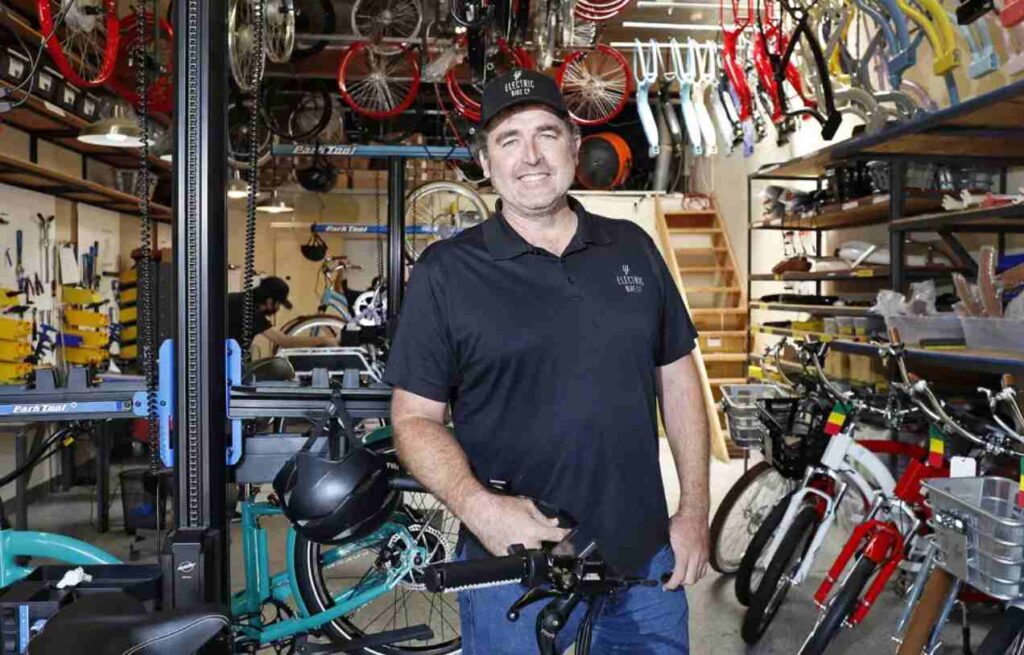Electric Bicycle Co., a California-based assembler and painter of custom e-bikes, filed for Chapter 7 bankruptcy liquidation last week, reporting total liabilities of $6.1 million, including secured claims of $960,000, and assets of $953,000.
South African-born Sean Lupton-Smith, who founded EBC about 14 years ago following a career as a restaurateur, told BRAIN on Wednesday that U.S. tariffs on imported components contributed heavily to the company’s collapse.
“(I) thought Trump would save the day but in fact our tariffs on our parts went up from 25% to 55% and more,” he said in an email. “KILLED us as well as financing charges and other factors — but competitors are skirting tariffs through other countries — under invoicing and selling direct and often below costs without legitimate certifications, safety standards, etc.”
Lupton-Smith said he was devastated by the failure and is now redirecting his efforts toward ebikesafety.com, a platform providing safety tips for e-bike riders.
“I’m pivoting now to focus on e-bike safety — with all my knowledge of building here in USA — I’m going to now use that to make e-bikes safer, especially for kids, and get laws and legal requirements to be enforced,” he said. “Without proper tariff protection and legit safety standard enforcement, no one will ever be able to make an e-bike in the USA in my opinion.”
In a 2020 BRAIN article, Lupton-Smith explained that EBC could not compete on price with Asian-made e-bikes, so he aimed to create customizable bikes with as much U.S.-made content as possible to reduce tariff exposure. At EBC’s Newport Beach factory, workers painted frames, fenders, and chainguards to order, built wheels, assembled battery packs, and packaged complete bikes.
In 2020, he said about 22% of the value of EBC bikes came from China, with the rest sourced from Taiwan, Japan, the Netherlands, and the U.S., including a wooden chainguard made by a furniture maker in Oregon. “The bike industry is not for sissies, I’ve learned that,” he told BRAIN. At the time, EBC employed around 40 people.
Lupton-Smith lobbied for tariff relief on bicycle and e-bike components, which became particularly painful after Section 301 tariff exclusions on Chinese e-bikes expired in May 2024.
Earlier this year, the company launched a crowdfunding campaign with a target of $20,000 to $1.23 million, raising $171,000 before closing on September 12. A prospectus noted EBC had sales of $9.5 million in its most recent fiscal year, with a net loss of $1.975 million.
Meanwhile, Kent International shut its South Carolina assembly plant this summer, citing component tariffs as a barrier to competing with imported bikes, while Fuell, another e-bike brand supported by crowdfunding, filed for Chapter 7 bankruptcy last October.




I am astounded at the the number of trees that voted for the lumberjack. I shed zero tears for this CEO, but feel terrible for his employees.
He didn’t think the leopards had room for HIS face. Boy was he wrong! Get rekt, loser.
Hahahahhahahaha…
How does a small electric bike business that assembles and paints bikes in a shop the size of a garage have 6.1 million in liabilities? No wonder he voted for Trump he is a fellow fradster with as much business sense as Trump, just not the hundreds of millions in backing from his father.
Markets flooded with e-bikes, it will be a bloodbath for ev bike brick and mortar nothing lasts forever. Too many e bikes, prices crater, cheaper online from China, don’t go into the e bikes brick and mortar with high overhead. Capitalism.
Also don’t vote for the guy who ramped up tarriffs last time he was in power, and said he will bump tarriffs this time?
I bought a bike from this company on 2021. Now that I know this filth is a trumpanzee, he can go to hell. When it can’t be repaired, I’ll buy a new one from a better person and company. Fvck Sean and his EBC. Service went to shit starting in 2023 and 2024.
Aww Gee. Well, Trump is very special to some people.